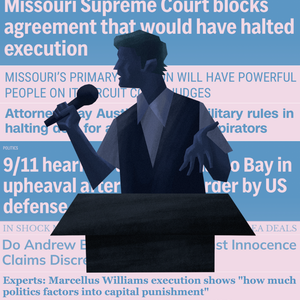
In this month’s episode of Discussions with DPIC, Managing Director Anne Holsinger speaks with Leah Roemer, DPIC’s Legal Fellow and a primary author of our recent report, Lethal Election: How the U.S. Electoral Process Increases the Arbitrariness of the Death Penalty. Leah graduated from Berkeley Law in 2023, where she participated in the Death Penalty Clinic and earned a certificate in Public Interest and Social Justice. Leah discusses how some judges, prosecutors, and politicians alter their behavior in capital cases while running for office, creating unpredictability and inconsistent outcomes for people facing death sentences. However, she explains that the “accepted political wisdom” about the death penalty — that an official must take a pro-death stance to win an election — no longer appears to be true based on DPIC’s research, as many voters now favor candidates willing to criticize or even oppose capital punishment.
The Lethal Election report found that elected state supreme court justices affirmed twice the number of death penalty cases in election years compared to other years, a result that was statistically significant when controlling for the number of cases heard each year. “Our judicial system rests on an assumption of impartiality,” Leah says, but there is “a tension between the expectations of an election and the expectation of impartiality.” When judges are forced to campaign on their past record, raise money, and make promises for the future, they may rule more harshly in death penalty cases in an attempt to appeal to voters. DPIC’s research suggests that all facts of the cases being equal, a prisoner appealing a death sentence in a judicial election year is more likely to lose than a prisoner who appeals in a non-election year.
The report also details how executive officials are more likely to grant clemency in death penalty cases when not up for reelection. In places where executives have sole authority to grant clemency, DPIC found that 85% of individual clemency grants occurred when the executive was not facing reelection. “That suggests, I think, a strong political influence, that they were afraid of making those grants when they did have to face voters, and they believed that voters would punish them for granting clemency,” Leah says.
However, Leah emphasizes that there was “no evidence that voters responded negatively to an anti-death penalty position,” including clemency grants. In fact, DPIC “found evidence of the opposite”: some places that “historically were huge bastions of capital punishment,” like Harris County, Texas, now elect prosecutors who criticize the death penalty and use it sparingly. Recent polling in Harris County, which historically has executed more people than any other county in America, shows that only 20% of residents favor the death penalty as a punishment for murder when life without parole and life with parole are available. “This evidence really undercuts what had been seen, I think, as a core part of the political playbook for so many decades,” Leah concludes.
To learn more, listen to the latest episode of Discussions with DPIC. Read Lethal Election: How the U.S. Electoral Process Increases the Arbitrariness of the Death Penalty.
Arbitrariness
Oct 04, 2024

A Chance at Life, Withdrawn: When Politics Interferes with Plea Deals
Arbitrariness
Jan 03, 2024
